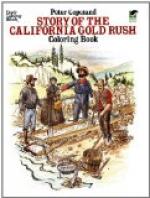As there were no women living here for some time, the men having left their families at home in the Eastern states, miners had to wash and cook and make bread for themselves. Men who had been lawyers or ministers at home, when there was no one else to do such things, washed their dishes or their red flannel shirts. On Sunday no one worked at mining, and the men baked bread and cleaned house, and Sunday afternoons they dried, patched, and mended their clothes. If a minister was in town, he held services on a hillside, or in the dining room of some shanty called a hotel, and all the camp came to hear him speak, or sang the hymns with him.
So the miners lived and worked and wandered along rivers and rough mountain trails on the west side of the Sierras, gathering up gold washed down by mountain streams. These Argonauts, or gold-seekers of fifty years ago, are almost all dead now, but the treasures they found made California known throughout the world. Their golden harvest has made the state richer than they found it, for they used the wealth to build cities, to cultivate farming-lands, and to plant orchards and vineyards where the mining-camps used to be.
HOW POLLY ELLIOTT CAME ACROSS THE PLAINS
This is the story of a little girl who in 1849 rode all the way from Ohio to California in an emigrant wagon. Polly Elliott has grandchildren of her own now, but she remembers very well the spring morning when her father came home and said to her mother, “Lizzie, can you get ready to start for the land of gold next week?” She hears again her mother saying, “Oh, John, with all these little children?” She says her father answered by swinging her, the eleven-year-old Polly, up to his shoulder and calling out, “Here’s papa’s little woman; she’ll help you take care of them,” as he carried her round the room, laughing.
This was “back East,” as Polly Elliott, now Mrs. Davis, says,—in Ohio, where they had a pretty white house set round with apple and peach orchards all white and pink that May day. Her mother cried because they must leave the house, and because they had to sell all their furniture and the stock except Daisy, the pet cow, and Buck and Bright, the oxen, who were to draw the wagon. A round-topped cover of white cloth was fixed on the big farm-wagon. Then they piled into it their bedding in calico covers, a chest or two holding clothes and household goods, a few dishes and cooking things, and plenty of flour, corn meal, beans, bacon, dried apples and peaches, tied up in sacks.
Polly says she supposed the trip would just be one long picnic, while the four children thought it fine fun to “sit on mother’s featherbed and go riding,” as they said. So they started off for California. A long, long ride these emigrants had before them; a weary trip, plodding along day after day with the patient oxen walking slowly and the burning sun or pelting rain beating down on the wagon cover. There was a train of other wagons with them, some pulled by horses but more by yoked oxen, and the men walked beside the animals and cracked long whips. A few men were on horseback, but all kept together, for Indians were plenty and were often hiding near the road, watching for a chance to cut off and capture any wagons lagging behind the party.




